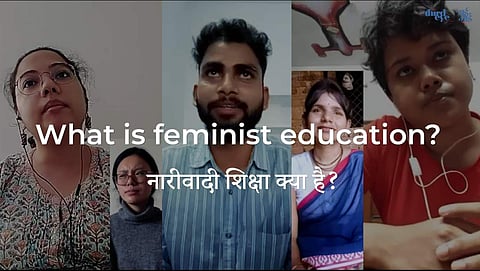

Gender is everywhere. The 25 individuals featured in the 6-minute short documentary film Let’s Break it Down concur. When The Third Eye, a feminist think tank, asked Indians from every walk of life what the words gender, sexuality and a feminist education meant to them, the answers ranged from ‘violence’ and ‘identity’ to Oyo Rooms.
The Third Eye was set up by Nirantar: A Centre for Gender and Education which has been working extensively around women and education for the past three decades. Their work has been pushing across the idea of a feminist pedagogy which asks, ‘If you put gender at the centre of everything, how differently would you see the world?’
After working in various avenues of knowledge creation, initiating pedagogical interventions in rural India and with the content in NCERT textbooks, last year, they set up The Third Eye team for this project. They needed them to find a new way to convey this knowledge online and use digital tools to expand the horizons of gender education. The Third Eye has been experimenting with audio and video around the subject and creating knowledge resources in a way that students and anyone who is working with communities can use to understand how to look at their work through a feminist lens.
Editor of The Third Eye and documentary filmmaker Shabani Hassanwalia says, “When we started this platform, everyone asked us what a feminist education was and they kept saying that it was simply rights, rights and more rights. And we said it’s not just that. So in a way, Let’s Break It Down was actually an experiment for ourselves. We asked people what they understood by gender, sexuality and what was one memory that you carried with them. And we wanted to see what would happen. Let them tell us.”
And the answers stunned the Third Eye team. “You won’t believe it. We did the interviews during the lockdown and actually thought they would be really short. Eventually, each interview was like a long session. Seeing the kind of reaction that was triggered in people just by using the words ‘gender’ and ‘sexuality’ was a revelation even if they had never thought of this or come from a world that talks about gender. This is why we put this film together, to say that actually there is no one form of education or learning.”
They continue, “We carry a lot of our histories with us, which has to be a part of how we learn. People keep talking about contextual pedagogy. There are such incredible ways of learning waiting for us. That is something that I personally want to explore in various ways. Why does this happen and is it a wasted opportunity in mainstream education spaces?”
The film was released on YouTube on February 4. Some of the people featured in the film include Nikhil Taneja, the founder of youth and mental health organisation Yuvaa, Shabina who works on violence against women with Vanangana, a rural community-based women's rights collective located in Uttar Pradesh and Pavel Sagolsem, who set up Nazariya, a queer feminist resource group based in New Delhi.
The next one hopes to focus on cities through a feminist perspective. “The perspective that changed for me is that gender is everywhere. It’s your politics, your social construct, your relationship with your family, it’s your tendency to anger and your psychological makeup,” affirms Shabani.
What the Third Eye perspective does differently from mainstream education is making it about the individual. “I never thought education could be about me,” she says, “You always learn about others. The fact that educational or any learning paradigm can be about yourself seems to have struck a chord with many young people who have written in to us.”
